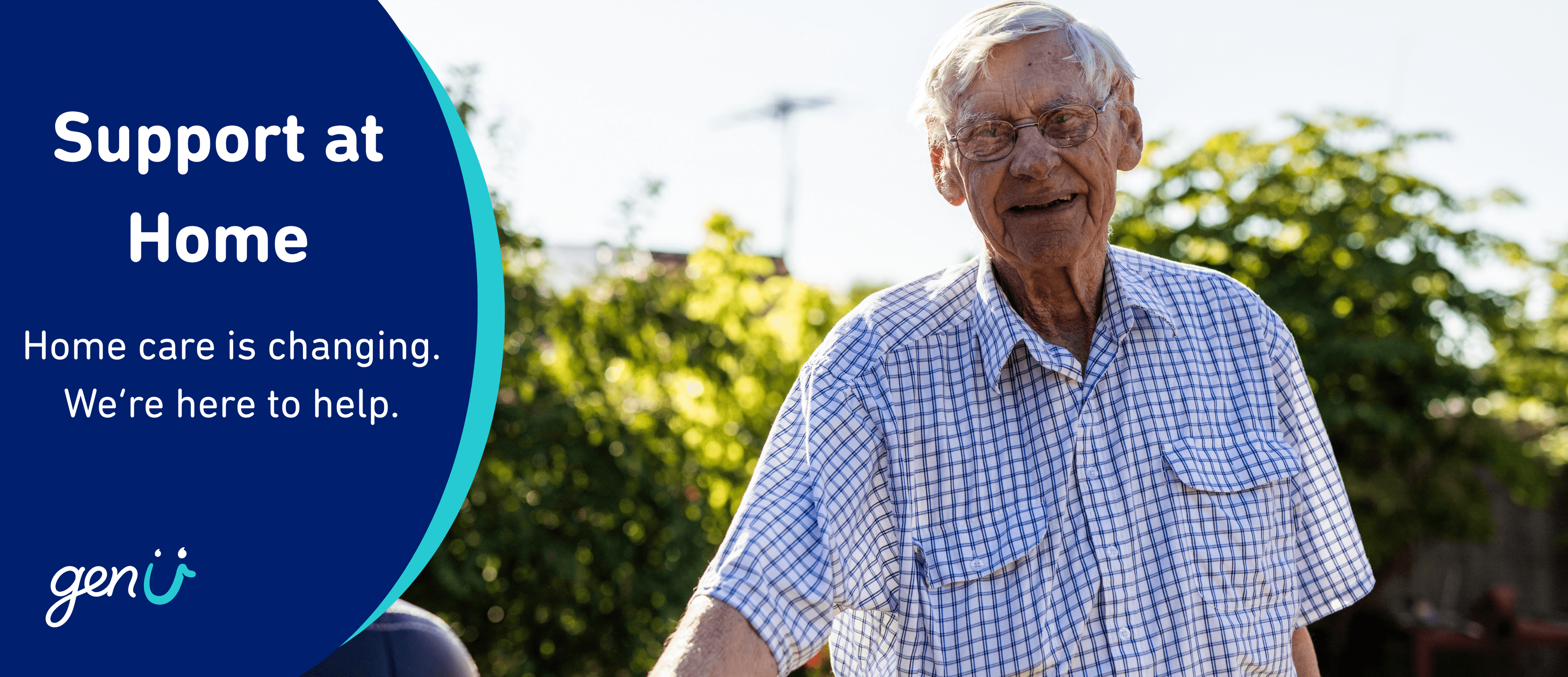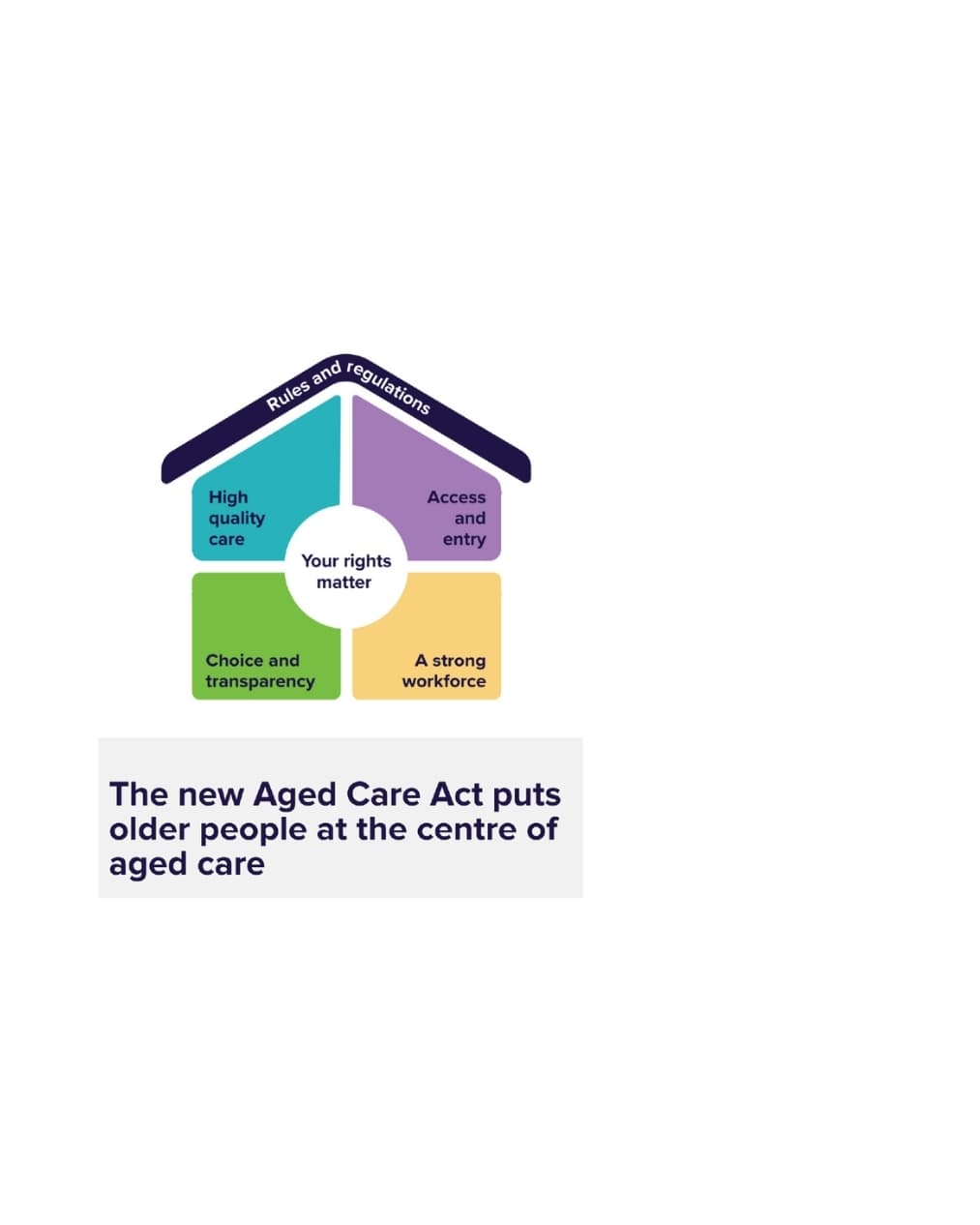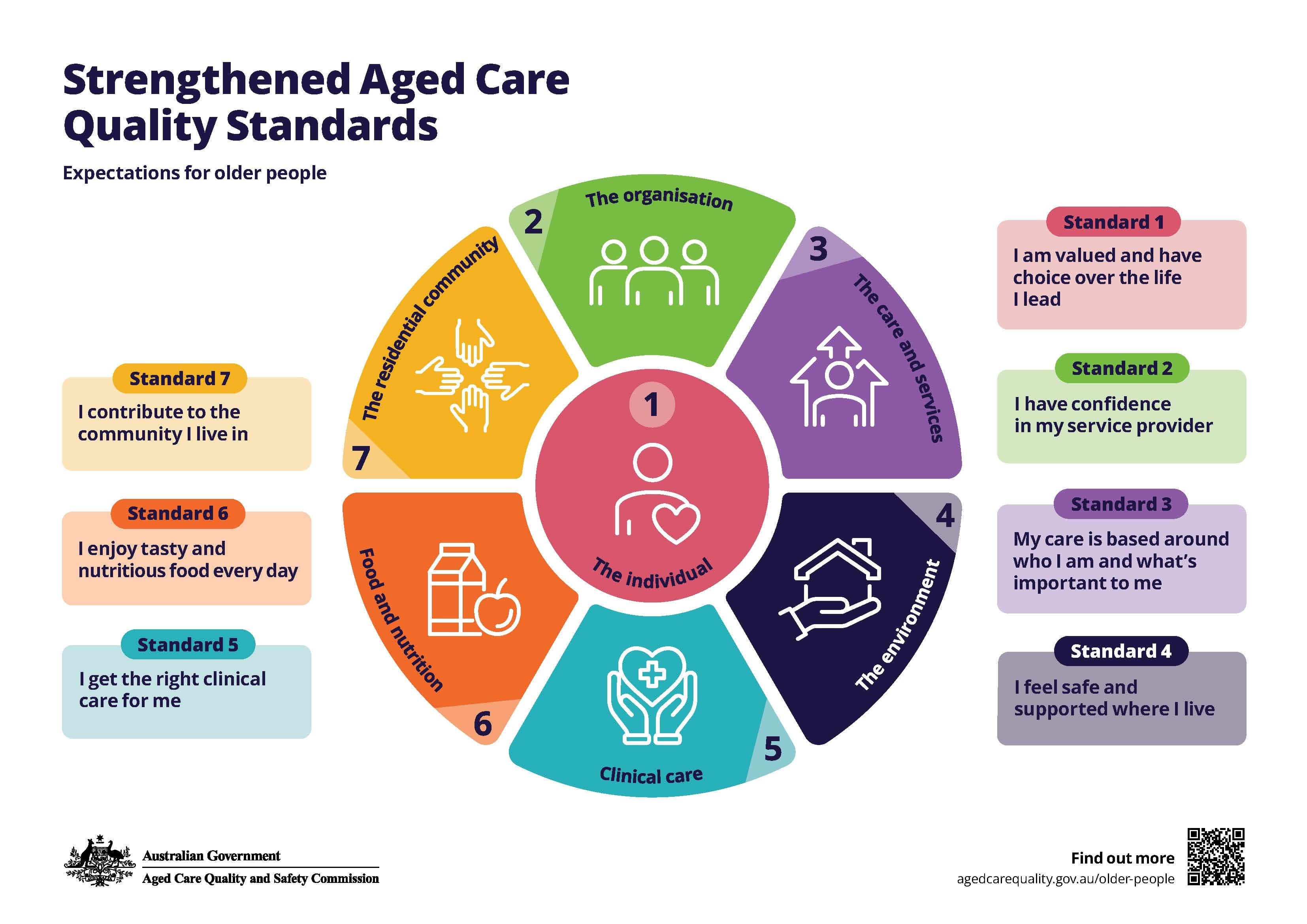
Supporting your transition to Support at Home
Aged care is changing from 1 November 2025 in response to the 2021 Royal Commission into Aged Care Quality and Safety.
The Australian Government is introducing a new rights-based Aged Care Act, strengthening the Aged Care Quality Standards and commencing the Support at Home program.
Here’s an overview of what you can expect under the new Support at Home program and how genU will support you through the changes.
Key Changes under Support at Home
These changes being introduced with the Support at Home program aim to simplify care access, aligning services with each person’s needs and goals.
The major changes are summarised below.
New Service Categories
Under Support at Home, there is a clear list of services that may be available to you, categorised into:
Clinical Care: such as nursing, occupational therapy and physiotherapy – Fully funded by the government
Independence Support: such as personal care, transport and assistance technology – Moderate client contributions required of between 5–50%
Everyday Living Assistance: such as cleaning, gardening, shopping and meal preparation – Higher client contributions may apply, from 17.5- 80% of the costs.
Each category will have its own service types and participant contribution arrangements, providing more transparency about what is and isn’t covered for you.
Participant Fee Contributions
Participants will contribute to the cost of some services based on their income and assets, using the Age Pension means test. Certain services will remain free of charge, and contributions will only apply to services received.
| Clinical Care | Independence | Everyday Living | |
|---|---|---|---|
| Full pensioner | 0% | 5% | 17.5% |
| Part pensioner with Commonwealth Seniors Health Care | 0% | 5% - 50% depending on income and assets | 17.5% - 80% depending on income and assets |
| Self-funded retiree | 0% | 50% | 80% |
New Funding Classification Levels
Participants will be assessed into one of 10 funding classifications based on your income and assets, using the Age Pension means test, and support requirements:
- 8 ongoing classifications, ranging from $11,000 to $78,000 annually
- 3 short-term classifications (Restorative Care, End-of-Life and Assistance Technology and Home Modifications)
This system offers a more tailored approach compared to the previous 4-level HCP system.
You will continue to receive the same funding level on Support at Home as you do with your Home Care Package. The amounts for each classification are indicative and are subject to indexation.
| Classification level | Quarterly budget | Annual amount |
|---|---|---|
| 1 | $2,674.18 | $10,697.72 |
| 2 | $3,995.42 | $15,981.68 |
| 3 | $5,479.94 | $21,919.77 |
| 4 | $7,386.33 | $29,545.33 |
| 5 | $9,883.76 | $39,535.04 |
| 6 | $11,989.35 | $47,957.41 |
| 7 | $14,530.53 | $58,122.13 |
| 8 | $19,427.22 | $77,709.00 |
| Restorative Care Pathway | ~$6,000 (12 weeks) May be increased to ~$12,000 when eligible | |
| End-of-Life Pathway | ~$25,000 (12 weeks) | |
| Assistive Technology and Home Modifications scheme | Low, medium or high funding tiers as assessed | |
The highest ongoing classification provides up to $78,000 per year in support, which has increased from $61,440 under the Home Care Package program.
Our genU team can assist you to understand how the funding level apply and what that means for your services entitlements and fees.
New Quarterly Budgets with Flexibility
Quarterly budget
Participants will receive a quarterly budget aligned with your funding classification. You can carry over up to $1,000 or 10% (whichever is higher) of unspent funds to the next quarter, offering flexibility in managing your care.
Care management fee
It’s important to note that 10% of your quarterly budget will be set aside for care management, ensuring you receive help to coordinate and adjust your services as needed. There is no separate administration or management fees.
Assistive Technology and Home Modifications
Up to $15,000 is available upfront for things like walking aids and bathroom modifications, so you will not have to accumulate or ‘save up’ funds to pay for this support. There will be three funding tiers for Assistive Technology and three tiers for Home Modifications (Low, Medium, and High), and funding will range from $500 to $15,000 depending on your tier.
Your genU Care Partner can support you to manage your quarterly budget, prioritise the services that matter most and optimise the funding available to you.
Fee Transition Arrangements
Price caps
Fees for services will be guided by government-set price caps being introduced in July 2026 to ensure affordability and prevent overcharging or unexpected fees. Price caps will encompass the full cost of service delivery, including administration costs, meaning providers (including genU) cannot charge separate entry, exit, or administration fees.
Grandfathered fee clients
Under a ‘grandfathering’ arrangement and ‘no worse off’ principle, current Home Care Package recipients will not pay more for their care.
A grandfathered client is someone who, as of 12 September 2024, was already receiving a Home Care Package, was on the National Priority System (NPS) waiting list, or had already been assessed as eligible for a Home Care Package.
If you’re a grandfathered client:
- You’ll pay the same or less than you would have under the current Home Care Package system
- If you’re a full-rate pensioner who pays no fees now, you will not pay fees under Support at Home
- If you are currently contributing fees, the rate may change—but you will not pay more than you currently do
- If you are later reassessed (after 1 July 2025), your contribution may be adjusted based on your services, but only if it results in a fair outcome.
Hybrid fee clients
If you were approved for a Home Care Package between 13 September 2024 and 30 June 2025 (inclusive), you’re considered to be on a ‘hybrid’ client fee arrangement.
This means for you will move to the standard Support at Home arrangements on 1 November 2025 and your care and contribution arrangements will follow the new Support at Home pricing and fees framework.
Short-term Support
Through Support at Home comes additional restorative care funding (with 12 weeks of intensive allied health support) and a new End-of-Life Pathway to help those with less than 3 months to live, with up to $25,000 in additional support to remain at home in their final months.
Care Management
genU has a dedicated team of Care Partners who will provide your care management. This includes planning, reviewing and monitoring care and service delivery with you. Care Partners are appropriately trained and experienced aged care workers.
The care management fee is 10% of your quarterly budget; it is not an additional fee.
Your genU Care Partner will undertake the following in collaboration with you:
- Refer to your Individual Support Plan in the My Aged Care (MAC) portal to develop, coordinate and review your care plan and services
- Ensure you receive appropriate and effective care
- Help you understand your care and services available
- Assist with access to health and other support services
- Monitor and manage your quarterly budget to meet your needs and optimise available funding
- Refer to MAC for a Support Plan Review when needed.
Support at Home participants will receive an annual review of their care plan and monthly contact with their Care Partner.
As care management fees are built into and capped under the quarterly budget, participants will no longer have unlimited contact with their Care Partners.
What Other Changes are Happening?
As well as introducing the new Support at Home program, the aged care reforms is also bringing a new rights-based Aged Care Act and strengthened Aged Care Quality Standards. Here’s an overview of both.

New Aged Care Act
The new rights-based Aged Care Act 2024 starts from 1 November 2025 in response to the recommendations from the 2021 Royal Commission. The new Act:
- responds to the issues facing older people, aged care providers, workers and the broader sector
- introduces laws to make sure all aged care services are safe and people are treated with respect
- puts your rights at the centre of the aged care system
- provides for stronger powers for the regulator, the Aged Care Quality and Safety Commission.
All aged care programs will operate under a similar registration model with the same obligations to deliver services that place you at the centre of your aged care. Stronger care standards and better monitoring of providers will make aged care safer.
The new Act includes a Statement of Rights that explains what rights older people have when accessing government-funded aged care services. It gives you the right to:
- make your own decisions about your own life
- have your decisions not just accepted, but respected
- get information and support to help you make decisions
- communicate your wishes, needs and preferences
- feel safe and respected
- have your culture and identity respected
- stay connected with your community.
Read the Statement of Rights fact sheet to learn more
Strengthened Quality Standards
The current Aged Care Quality Standards will be strengthened as part of the new Aged Care Act and regulatory model to deliver a better aged care experience. They explain what safe quality care should look like and help providers deliver the care that older people need and expect.
While many requirements of the strengthened Standards remain the same, or are similar to the current Standards, there are some new requirements. The changes for genU are primarily administrative and compliance based. There will be little noticeable change in how our services are delivered to you.
You can visit www.agedcarequality.gov.au/older-australians/reform-changes-older-people/strengthened-quality-standards for more information or refer to the poster image below.

What Actions are Required
In mid-October 2025, genU’s Home Care Package clients were provided with:
- A new Client Services Agreement – please review, sign and return to genU by Friday 31 October
- A Direct Debit Request Form (part of the above) for those clients not currently paying by direct deposit
- The new Support at Home fee schedule, effective from 1 November
- Their first Support at Home quarterly home care budget.
This budget is based on your current government assessed care classification and reflects how this aligns with the new Support at Home funding framework. You may have received a letter from the government confirming your classification and any applicable co-contribution requirements.
Your Care Partner can assist you to prioritise services and optimise the funding available to you.
Next Steps
As a current Home Care Package recipient, you will automatically transition to the Support at Home program on 1 November 2025.
If we do not receive your signed Service Agreement by 31 October 2025, we will assume you wish to continue receiving services under the updated terms. Services will not be discontinued if you choose to wait for further advice from Services Australia before signing.
How to Access More Information
To stay up to date, you can visit the Department of Health and Aged Care’s Support at Home webpage: www.health.gov.au/our-work/support-at-home
Here are some links to other government resources designed to provide additional information and clarity about the aged care changes:
- Aged Care Act and Statement of Rights fact sheet
- Strengthened Quality Standards poster
- Support at Home program resources
- Government letter about preparing for the new Support at Home program
- Government letter regarding the delay to the Support at Home program
- Support at Home pricing protections fact sheet
Frequently Asked Questions
Support at Home is a new aged care program starting on 1 November 2025. It will replace the current Home Care Package (HCP) program and is designed to improve in-home care by offering more flexibility, transparency and support for older Australians to live independently at home for longer.
Yes. If you’re currently receiving a Home Care Package, you’ll automatically transition to the Support at Home program. If you’re on the National Priority System (waiting list), your funding will commence at the level you were approved for when it becomes available.
If you are already approved for or receiving a Home Care Package, you will move automatically transition to Support at Home. A reassessment may only be required if your care needs have changes or your care level needs to be reviewed under the new classification system.
Support at Home has 8 funding levels, replacing the 4 current ones under the Home Care Package program.
Funding levels will be based on your care needs and assessment outcomes, with a priority rating of high, medium or standard.
- Your funding will be divided into quarterly budgets (every 3 months) aligned with your funding classification.
- If you don’t spend all your funds in one quarter, you can carry over up to $1,000 or 10% (whichever is higher) to the next quarter
- Funds will be managed by Services Australia to ensure transparency
- Your genU Care Partner can support you to manage your quarterly budget and prioritise the services that matter most and optimise the funding available to you.
Your funding will be managed by Services Australia. You only pay for services you receive (there no upfront fees). Your provider (genU) will collect your participant contributions directly from you and provide monthly statements.
Your current fee arrangements will stay the same until 31 October 2025.
genU’s Support at Home Service Fee Schedule, effective 1 November 2025, is available here
If you are a ‘grandfathered’ client, the ‘no worse off’ principle will apply beyond 1 November 2025. If you are a ‘hybrid’ client, you will transition to the new fee contribution framework on 1 November 2025. Refer to the ‘Fee Transition Arrangements’ section above.
You will be able to carry over unspent Home Care Package funds into the Support at Home program. However, rollover will be subject to new rules and limits under the Support at Home model. We will explain these conditions to you once the government releases the final rules.
We’re Here to Support You
The team at genU is already providing information and support to guide our Home Care Package clients through the transition to Support at Home. We understand how important it is that you can continue to access the supports you need to maintain your independence at home, with confidence.
Regular communications will be provided as Support at Home is implemented but you can reach out anytime.
Have questions about the changes and how they might impact you?
Please don’t hesitate to call us on 1300 734 323 or email us at HCPcareteam@genu.org.au

Download our Support at Home guide
Our simple PDF guide helps you understand the changes, navigate services, and make the most of your aged care funding at home.